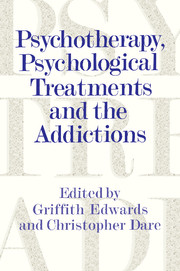Book contents
- Frontmatter
- Contents
- List of contributors
- Psychotherapy and psychological treatments of substance problems: generalism, specialism and the building of bridges
- Acknowledgements
- Part one Backgrounds to therapeutic understanding
- Part two Treatments
- 5 Psychotherapy: why do some need more and some need less?
- 6 Addictive behaviour: the next clinic appointment
- 7 Advances in families and couples therapy
- 8 Solution focused brief therapy: a co-operative approach to work with clients
- 9 Recent developments in cognitive and behavioural therapies
- 10 Cognitive and behavioural treatments for substance misuse
- 11 Motivational issues in the treatment of addictive behaviour
- 12 Can ‘stages of change’ provide guidance in the treatment of addictions? A critical examination of Prochaska and DiClemente's model
- 13 Group therapy and the addictions
- 14 Alcoholics Anonymous as mirror held up to nature
- 15 How therapeutic communities work
- Part three Postscript
- Index
5 - Psychotherapy: why do some need more and some need less?
from Part two - Treatments
Published online by Cambridge University Press: 05 August 2016
- Frontmatter
- Contents
- List of contributors
- Psychotherapy and psychological treatments of substance problems: generalism, specialism and the building of bridges
- Acknowledgements
- Part one Backgrounds to therapeutic understanding
- Part two Treatments
- 5 Psychotherapy: why do some need more and some need less?
- 6 Addictive behaviour: the next clinic appointment
- 7 Advances in families and couples therapy
- 8 Solution focused brief therapy: a co-operative approach to work with clients
- 9 Recent developments in cognitive and behavioural therapies
- 10 Cognitive and behavioural treatments for substance misuse
- 11 Motivational issues in the treatment of addictive behaviour
- 12 Can ‘stages of change’ provide guidance in the treatment of addictions? A critical examination of Prochaska and DiClemente's model
- 13 Group therapy and the addictions
- 14 Alcoholics Anonymous as mirror held up to nature
- 15 How therapeutic communities work
- Part three Postscript
- Index
Summary
Introduction
Psychoanalytic psychotherapy draws upon psychoanalysis for its theory and its technique, the main difference between the two being the frequency with which sessions are held. The former offers sessions one to three times and the latter four to five times per week. Both aim to understand, through the analysis of transference and resistance, the unconscious underpinning of symptoms and dysfunctional relationships. Psychoanalytic theory is still evolving, partly through dialogue among competing theoretical perspectives (Frosch, 1987), partly through the challenges thrown up by patients who are dificult to treat (Klein, 1932; Rosenfeld, 1965; Searles, 1965; Kernberg et al., 1989) and partly in articulation with adjacent disciplines such as developmental psychology (Stern, 1985; Murray-Parkes et al., 1991).
A parallel development has been various attempts to modify psychoanalytic technique in the service of brief dynamic therapies (Malan, 1963; Ryle, 1975, 1990; Davanloo, 1978; Luborsky, 1984; Strupp and Binder, 1984; Malan and Osimo, 1992; Sifneos, 1992). These have been shown to be useful where treatment trials have been done and to have roughly the same potency as cognitive therapy, in various clinical settings (Crits- Christoph, 1992).
In this chapter the focus will be on advances in clinical concepts in relation to change and the psychotherapeutic process, rather than the current state of process and outcome research in psychodynamic psychotherapy. There has been an enormous research effort in this area in the USA and, with the ‘third generation’ psychotherapy research projects, findings are beginning to emerge that have clinical relevance. Good recent surveys of the state of the field can be found by Dahl et al. (1988), Luborsky et al. (1988) and Luborsky and Crits-Christoph (1990). These projects have built on the experience of the Menniger Foundation Psychotherapy Research Project (Kernberg et ai, 1972; Horowitz, 1974; Appelbaum, 1977; Wallerstein, 1986). We will be drawing here on a particular line of development within psychoanalysis that is peculiarly British, the Kleinian tradition (Spillius, 1983, 1988), and which contributes to our understanding of some of the psychodynamic forces that may drive a person to become addicted to alcohol or drugs. For reviews of the psychoanalytic literature on the addictions see Rosenfeld (1960, 1964), Yorke (1970), Meissner (1981) and Smaldino (1991).
- Type
- Chapter
- Information
- Publisher: Cambridge University PressPrint publication year: 1996
- 1
- Cited by



